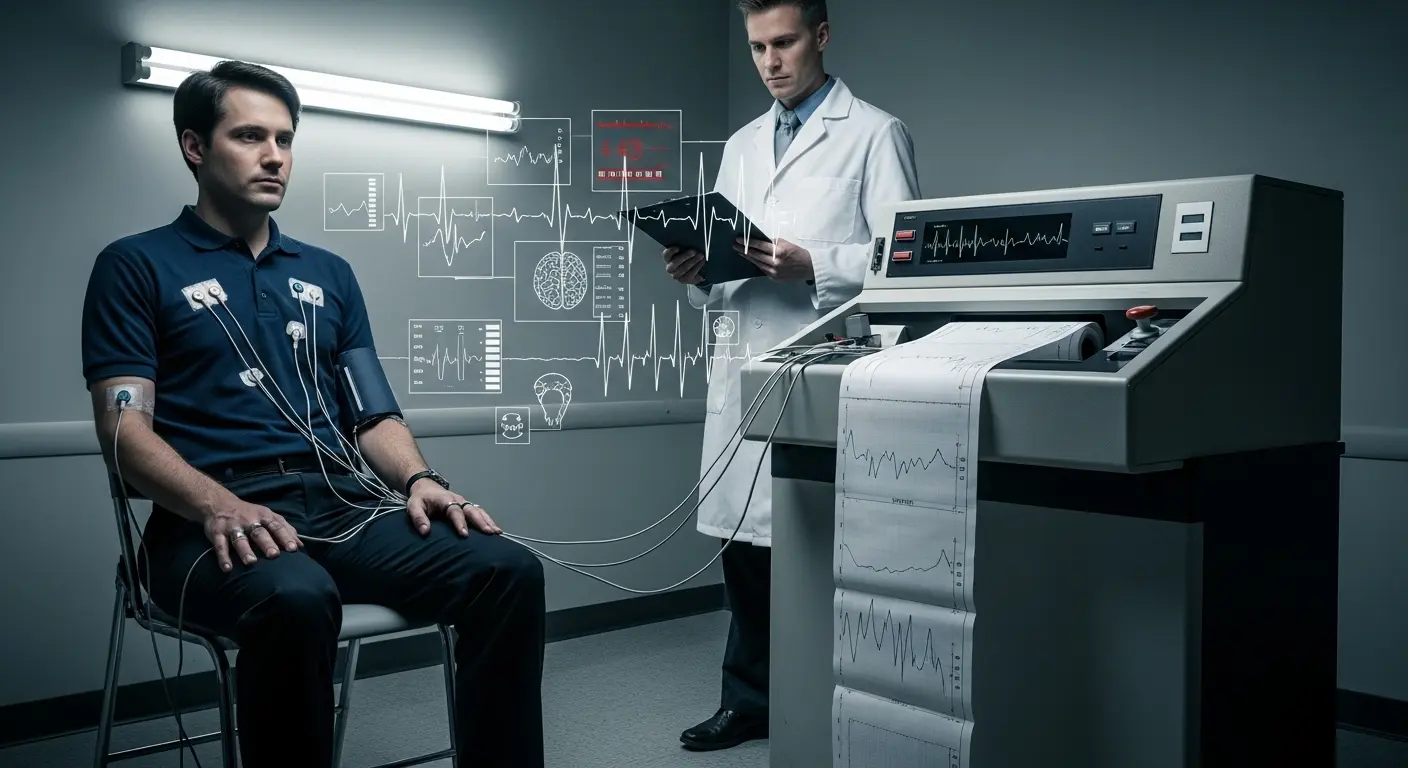Vídeo | The Language of Lying
Enquanto a humanidade busca, há séculos, métodos infalíveis para desvendar mentiras – de polígrafos a escâneres cerebrais – a chave para a detecção da falsidade pode residir não nas reações fisiológicas, mas na própria linguagem que usamos. Este texto explora como a ciência da comunicação e a análise linguística de textos revelam padrões inconscientes na fala e na escrita de quem mente, identificando quatro indicadores cruciais: menos referências pessoais, um tom mais negativo, explicações simplistas e estruturas de frase desnecessariamente complexas. Ao decifrar esses sinais sutis, é possível desmascarar a decepção escondida nas palavras, oferecendo uma nova perspectiva sobre a verdade.
| Audio | |
|---|---|
Normal | Slow |
| English Transcript | Tradução |
| "Sorry, my phone died." | "Desculpe, meu celular ficou sem bateria." |
| "It's nothing. I'm fine." | "Não foi nada. Estou bem." |
| "These allegations are completely unfounded." | "Essas acusações são completamente infundadas." |
| "The company was not aware of any wrongdoing." | "A empresa não estava ciente de nenhuma irregularidade." |
| "I love you." | "Eu te amo." |
| We hear anywhere from 10 to 200 lies a day, and we spent much of our history coming up with ways to detect them, from medieval torture devices to polygraphs, blood-pressure and breathing monitors, voice-stress analyzers, eye trackers, infrared brain scanners, and even the 400-pound electroencephalogram. | Ouvimos de 10 a 200 mentiras por dia, e passamos grande parte de nossa história tentando detectá-las, desde dispositivos de tortura medievais até polígrafo, monitores de pressão arterial e de respiração, analisadores de estresse vocal, rastreadores oculares, scanners cerebrais infravermelhos e até mesmo o eletroencefalograma de 180 quilos. |
| But although such tools have worked under certain circumstances, most can be fooled with enough preparation, and none are considered reliable enough to even be admissible in court. | Mas, embora essas ferramentas tenham funcionado sob certas circunstâncias, a maioria pode ser enganada com preparação suficiente, e nenhuma delas é considerada confiável o bastante para sequer ser aceita em tribunais. |
| But, what if the problem is not with the techniques, but the underlying assumption that lying spurs physiological changes? | Mas e se o problema não estiver nas técnicas, mas na suposição subjacente de que o ato de mentir provoca mudanças fisiológicas? |
| What if we took a more direct approach, using communication science to analyze the lies themselves? | E se adotássemos uma abordagem mais direta, usando a ciência da comunicação para analisar as mentiras em si? |
| On a psychological level, we lie partly to paint a better picture of ourselves, connecting our fantasies to the person we wish we were rather than the person we are. | No nível psicológico, mentimos parcialmente para pintar uma imagem melhor de nós mesmos, conectando nossas fantasias à pessoa que desejamos ser, em vez de quem realmente somos. |
| But while our brain is busy dreaming, it's letting plenty of signals slip by. | Mas enquanto nosso cérebro está ocupado sonhando, ele deixa escapar diversos sinais. |
| Our conscious mind only controls about 5% of our cognitive function, including communication, while the other 95% occurs beyond our awareness, and according to the literature on reality monitoring, stories based on imagined experiences are qualitatively different from those based on real experiences. | Nossa mente consciente controla apenas cerca de 5% da nossa função cognitiva, incluindo a comunicação, enquanto os outros 95% ocorrem além da nossa consciência e de acordo com a literatura sobre monitoramento da realidade, histórias baseadas em experiências imaginadas são qualitativamente diferentes das baseadas em experiências reais. |
| This suggests that creating a false story about a personal topic takes work and results in a different pattern of language use. | Isso sugere que criar uma história falsa sobre um tema pessoal exige trabalho e resulta em um padrão de linguagem diferente. |
| A technology known as linguistic text analysis has helped to identify four such common patterns in the subconscious language of deception. | Uma tecnologia chamada análise linguística de texto ajudou a identificar quatro padrões comuns na linguagem subconsciente de enganos. |
| First, liars reference themselves less, when making deceptive statements. | Primeiro, mentirosos fazem menos referências a si mesmos ao fazer declarações enganosas. |
| They write or talk more about others, often using the third person to distance and disassociate themselves from their lie, which sounds more false: "Absolutely no party took place at this house," or "I didn't host a party here." | Eles escrevem ou falam mais sobre os outros, muitas vezes utilizando a terceira pessoa para se distanciar e se dissociar da mentira. O que soa mais falso: “Absolutamente nenhuma festa aconteceu nesta casa” ou “Eu não organizei nenhuma festa aqui”? |
| Second, liars tend to be more negative, because on a subconscious level, they feel guilty about lying. | Segundo, mentirosos tendem a ser mais negativos, porque, em um nível subconsciente, sentem culpa ao mentir. |
| For example, a liar might say something like, "Sorry, my stupid phone battery died. I hate that thing." | Por exemplo, um mentiroso pode dizer algo como: “Desculpe, a bateria do meu celular idiota acabou. Odeio esse troço.” |
| Third, liars typically explain events in simple terms since our brains struggle to build a complex lie. | Terceiro, mentirosos normalmente explicam os eventos de forma simples, já que nossos cérebros têm dificuldade em construir uma mentira complexa. |
| Judgment and evaluation are complex things for our brains to compute. As a U.S. President once famously insisted: "I did not have sexual relations with that woman." | Julgamentos e avaliações são coisas difíceis para o nosso cérebro processar. Como um presidente dos EUA uma vez insistiu famosamente: “Eu não tive relações sexuais com aquela mulher.” |
| And finally, even though liars keep descriptions simple, they tend to use longer and more convoluted sentence structure, inserting unnecessary words and irrelevant but factual sounding details in order to pad the lie. | E, por fim, mesmo que mentirosos mantenham as descrições simples, eles tendem a usar frases mais longas e estrutura de sentença mais convoluta, inserindo palavras desnecessárias e detalhes irrelevantes, com aparência de verdade, para reforçar a mentira. |
| Another President confronted with a scandal proclaimed: "I can say, categorically, that this investigation indicates that no one on the White House staff, no one in this administration presently employed was involved in this very bizarre incident." | Outro presidente, confrontado com um escândalo, afirmou: “Posso dizer, categoricamente, que esta investigação indica que ninguém no staff da Casa Branca, ninguém nesta administração atualmente empregado, esteve envolvido neste incidente muito bizarro.” |
| Let's apply linguistic analysis to some famous examples. | Vamos aplicar a análise linguística a alguns exemplos famosos. |
| Take seven-time Tour de France winner Lance Armstrong. | Pegue o sete vezes vencedor do Tour de France, Lance Armstrong. |
| When comparing a 2005 interview, in which he had denied taking performance-enhancing drugs to a 2013 interview, in which he admitted it, his use of personal pronouns increased by nearly 3/4. | Ao comparar uma entrevista de 2005, em que ele negava usar substâncias para aumentar desempenho, com outra de 2013, em que ele admitiu isso, o uso de pronomes pessoais aumentou em quase 3/4. |
| Note the contrast between the following two quotes. | Note o contraste entre as duas declarações. |
| First: "Okay, you know, a guy in a French, in a Parisian laboratory opens up your sample, you know, Jean-Francis so-and-so, and he tests it. And then you get a phone call from a newspaper that says: 'We found you to be positive six times for EPO." | Primeiro: "Ok, sabe, um cara em um laboratório francês, em Paris, abre sua amostra, sabe, Jean-Francis qualquer-coisa, e testa. E então você recebe uma ligação de um jornal dizendo: ‘Descobrimos que você testou positivo seis vezes para EPO.’” |
| Second: "I lost myself in all of that. I'm sure there would be other people that couldn't handle it, but I certainly couldn't handle it, and I was used to controlling everything in my life. I controlled every outcome in my life." | Segundo: “Eu me perdi em tudo aquilo. Tenho certeza de que haveriam outras pessoas que não conseguiriam lidar com isso, mas eu certamente não consegui, e eu estava acostumado a controlar tudo na minha vida. Eu controlava todos os resultados da minha vida.” |
| In his denial, Armstrong described a hypothetical situation focused on someone else, removing himself from the situation entirely. | Em sua negação, Armstrong descreveu uma situação hipotética focada em outra pessoa, removendo-se completamente da cena. |
| In his admission, he owns his statements, delving into his personal emotions and motivations. | Em sua confissão, ele assumiu suas falas, abordando suas emoções e motivações pessoais. |
| But the use of personal pronouns is just one indicator of deception. | Mas o uso de pronomes pessoais é apenas um indicador de engano. |
| Let's look at another example from former Senator and U.S. Presidential candidate John Edwards: "I only know that the apparent father has said publicly that he is the father of the baby. I also have not been engaged in any activity of any description that requested, agreed to, or supported payments of any kind to the woman or to the apparent father of the baby." | Vamos analisar outro exemplo, desta vez do ex-senador e candidato presidencial americano John Edwards: “Eu só sei que o aparente pai disse publicamente que ele é o pai do bebê. Eu também não estive envolvido em nenhuma atividade de qualquer natureza que tenha solicitado, concordado ou apoiado pagamentos de qualquer tipo à mulher ou ao aparente pai do bebê.” |
| Not only is that a pretty long-winded way to say, "The baby isn't mine," but Edwards never calls the other parties by name, instead saying "that baby," "the woman," and "the apparent father." | Além de ser uma maneira extremamente longa de dizer “O bebê não é meu”, Edwards nunca chama as outras pessoas pelo nome, referindo-se a elas como “aquele bebê”, “a mulher” e “o aparente pai”. |
| Now let's see what he had to say when later admitting paternity: "I am Quinn's father. I will do everything in my power to provide her with the love and support she deserves." | E agora, veja o que ele disse quando admitiu a paternidade: “Eu sou o pai de Quinn. Vou fazer tudo ao meu alcance para dar a ela o amor e apoio que ela merece.” |
| The statement is short and direct, calling the child by name and addressing his role in her life. | A declaração é curta e direta, chamando a criança pelo nome e abordando seu papel na vida dela. |
| So how can you apply these lie-spotting techniques to your life? | Então, como você pode aplicar essas técnicas de identificação de mentiras à sua vida? |
| First, remember that many of the lies we encounter on a daily basis are far less serious that these examples, and may even be harmless. | Primeiro, lembre-se de que muitas das mentiras que encontramos diariamente são muito menos sérias que esses exemplos, e podem até ser inofensivas. |
| But it's still worthwhile to be aware of telltale clues, like minimal self-references, negative language, simple explanations and convoluted phrasing. | Mas ainda vale a pena estar atento a pistas reveladoras, como referências mínimas a si mesmo, linguagem negativa, explicações simples e frases convolutas. |
| It just might help you avoid an overvalued stock, an ineffective product, or even a terrible relationship. | Isso pode ajudá-lo a evitar um investimento supervalorizado, um produto ineficaz ou até mesmo um relacionamento ruim. |
Contagem de palavras
A tabela abaixo exibe as palavras encontradas neste vídeo, bem como o número de vezes em que aparecem.
Veja também: Para que serve esta tabela?
| Freq. | Palavra | Freq. | Palavra | Freq. | Palavra |
|---|---|---|---|---|---|
| 32 | the | 27 | to | 25 | a |
| 23 | and | 19 | in | 17 | of |
| 16 | that | 15 | I | 10 | is |
| 9 | we | 9 | not | 9 | but |
| 8 | our | 8 | on | 8 | it |
| 7 | you | 7 | from | 7 | be |
| 6 | with | 6 | his | 6 | he |
| 6 | are | 5 | this | 5 | or |
| 5 | my | 5 | more | 5 | lie |
| 5 | father | 5 | even | 4 | use |
| 4 | say | 4 | personal | 4 | life |
| 4 | liars | 4 | by | 4 | baby |
| 4 | any | 4 | about | 3 | woman |
| 3 | which | 3 | when | 3 | what |
| 3 | was | 3 | us | 3 | they |
| 3 | these | 3 | themselves | 3 | so |
| 3 | simple | 3 | phone | 3 | person |
| 3 | other | 3 | only | 3 | one |
| 3 | no | 3 | lies | 3 | let |
| 3 | language | 3 | know | 3 | have |
| 3 | for | 3 | first | 3 | can |
| 3 | apparent | 3 | am | 2 | your |
| 2 | while | 2 | using | 2 | up |
| 2 | u | 2 | took | 2 | third |
| 2 | tend | 2 | techniques | 2 | such |
| 2 | subconscious | 2 | statements | 2 | sorry |
| 2 | situation | 2 | second | 2 | s |
| 2 | pronouns | 2 | president | 2 | party |
| 2 | negative | 2 | name | 2 | might |
| 2 | lying | 2 | love | 2 | linguistic |
| 2 | like | 2 | level | 2 | less |
| 2 | just | 2 | interview | 2 | if |
| 2 | house | 2 | her | 2 | has |
| 2 | handle | 2 | had | 2 | false |
| 2 | experiences | 2 | examples | 2 | example |
| 2 | everything | 2 | enough | 2 | edwards |
| 2 | direct | 2 | different | 2 | died |
| 2 | did | 2 | deception | 2 | could |
| 2 | convoluted | 2 | complex | 2 | communication |
| 2 | brains | 2 | brain | 2 | based |
| 2 | aware | 2 | at | 2 | as |
| 2 | armstrong | 2 | apply | 2 | another |
| 2 | analysis | 2 | an | 1 | wrongdoing |
| 1 | write | 1 | would | 1 | worthwhile |
| 1 | worked | 1 | work | 1 | words |
| 1 | wish | 1 | winner | 1 | winded |
| 1 | will | 1 | white | 1 | were |
| 1 | ways | 1 | way | 1 | voice |
| 1 | very | 1 | used | 1 | unnecessary |
| 1 | unfounded | 1 | underlying | 1 | under |
| 1 | typically | 1 | two | 1 | trackers |
| 1 | tour | 1 | torture | 1 | topic |
| 1 | tools | 1 | times | 1 | time |
| 1 | though | 1 | those | 1 | things |
| 1 | thing | 1 | there | 1 | then |
| 1 | them | 1 | their | 1 | than |
| 1 | text | 1 | tests | 1 | terrible |
| 1 | terms | 1 | telltale | 1 | technology |
| 1 | talk | 1 | taking | 1 | takes |
| 1 | take | 1 | sure | 1 | supported |
| 1 | support | 1 | suggests | 1 | stupid |
| 1 | struggle | 1 | structure | 1 | stress |
| 1 | story | 1 | stories | 1 | stock |
| 1 | still | 1 | statement | 1 | staff |
| 1 | spurs | 1 | spotting | 1 | spent |
| 1 | sounds | 1 | sounding | 1 | something |
| 1 | someone | 1 | some | 1 | slip |
| 1 | six | 1 | since | 1 | signals |
| 1 | short | 1 | she | 1 | sexual |
| 1 | seven | 1 | serious | 1 | sentence |
| 1 | senator | 1 | self | 1 | see |
| 1 | science | 1 | scanners | 1 | scandal |
| 1 | says | 1 | saying | 1 | sample |
| 1 | said | 1 | role | 1 | results |
| 1 | requested | 1 | removing | 1 | remember |
| 1 | reliable | 1 | relationship | 1 | relations |
| 1 | references | 1 | reference | 1 | reality |
| 1 | real | 1 | rather | 1 | quotes |
| 1 | quinn | 1 | qualitatively | 1 | publicly |
| 1 | psychological | 1 | provide | 1 | product |
| 1 | proclaimed | 1 | problem | 1 | pretty |
| 1 | pressure | 1 | presidential | 1 | presently |
| 1 | preparation | 1 | power | 1 | pound |
| 1 | positive | 1 | polygraphs | 1 | plenty |
| 1 | place | 1 | picture | 1 | physiological |
| 1 | phrasing | 1 | performance | 1 | people |
| 1 | payments | 1 | patterns | 1 | pattern |
| 1 | paternity | 1 | partly | 1 | parties |
| 1 | parisian | 1 | paint | 1 | pad |
| 1 | owns | 1 | overvalued | 1 | outcome |
| 1 | ourselves | 1 | others | 1 | order |
| 1 | opens | 1 | once | 1 | okay |
| 1 | often | 1 | occurs | 1 | now |
| 1 | nothing | 1 | note | 1 | none |
| 1 | newspaper | 1 | never | 1 | nearly |
| 1 | myself | 1 | much | 1 | motivations |
| 1 | most | 1 | monitors | 1 | monitoring |
| 1 | minimal | 1 | mine | 1 | mind |
| 1 | medieval | 1 | may | 1 | many |
| 1 | making | 1 | lost | 1 | look |
| 1 | longer | 1 | long | 1 | literature |
| 1 | liar | 1 | letting | 1 | later |
| 1 | lance | 1 | laboratory | 1 | known |
| 1 | kind | 1 | keep | 1 | judgment |
| 1 | john | 1 | jean | 1 | irrelevant |
| 1 | involved | 1 | investigation | 1 | into |
| 1 | instead | 1 | insisted | 1 | inserting |
| 1 | infrared | 1 | ineffective | 1 | indicator |
| 1 | indicates | 1 | increased | 1 | including |
| 1 | incident | 1 | imagined | 1 | identify |
| 1 | hypothetical | 1 | how | 1 | host |
| 1 | history | 1 | himself | 1 | here |
| 1 | helped | 1 | help | 1 | hear |
| 1 | hate | 1 | harmless | 1 | guy |
| 1 | guilty | 1 | get | 1 | function |
| 1 | french | 1 | francis | 1 | france |
| 1 | four | 1 | found | 1 | former |
| 1 | fooled | 1 | following | 1 | focused |
| 1 | fine | 1 | finally | 1 | feel |
| 1 | far | 1 | fantasies | 1 | famously |
| 1 | famous | 1 | factual | 1 | eye |
| 1 | explanations | 1 | explain | 1 | every |
| 1 | events | 1 | evaluation | 1 | epo |
| 1 | entirely | 1 | enhancing | 1 | engaged |
| 1 | encounter | 1 | employed | 1 | emotions |
| 1 | else | 1 | electroencephalogram | 1 | drugs |
| 1 | dreaming | 1 | do | 1 | distance |
| 1 | disassociate | 1 | devices | 1 | detect |
| 1 | details | 1 | deserves | 1 | descriptions |
| 1 | description | 1 | described | 1 | denied |
| 1 | denial | 1 | delving | 1 | deceptive |
| 1 | de | 1 | day | 1 | daily |
| 1 | creating | 1 | court | 1 | controls |
| 1 | controlling | 1 | controlled | 1 | contrast |
| 1 | considered | 1 | conscious | 1 | connecting |
| 1 | confronted | 1 | compute | 1 | completely |
| 1 | comparing | 1 | company | 1 | common |
| 1 | coming | 1 | cognitive | 1 | clues |
| 1 | circumstances | 1 | child | 1 | changes |
| 1 | certainly | 1 | certain | 1 | categorically |
| 1 | candidate | 1 | calls | 1 | calling |
| 1 | call | 1 | busy | 1 | build |
| 1 | breathing | 1 | blood | 1 | bizarre |
| 1 | beyond | 1 | between | 1 | better |
| 1 | been | 1 | because | 1 | battery |
| 1 | basis | 1 | awareness | 1 | avoid |
| 1 | assumption | 1 | approach | 1 | anywhere |
| 1 | analyzers | 1 | analyze | 1 | although |
| 1 | also | 1 | allegations | 1 | all |
| 1 | agreed | 1 | admitting | 1 | admitted |
| 1 | admission | 1 | admissible | 1 | administration |
| 1 | addressing | 1 | activity | 1 | according |
| 1 | absolutely |









